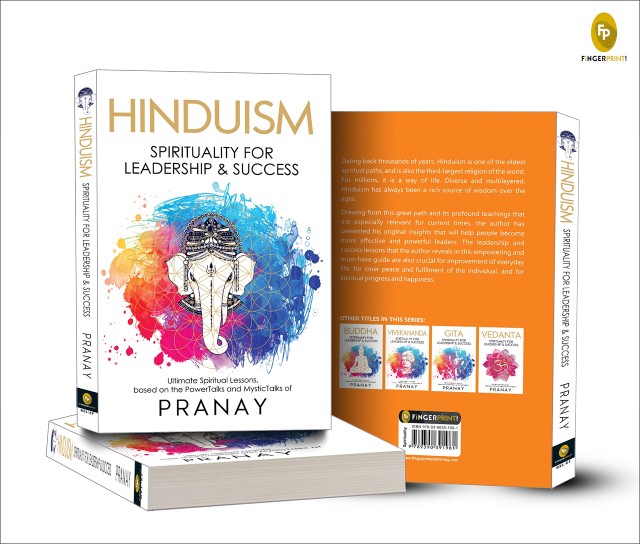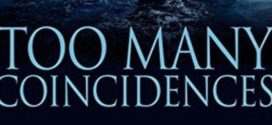Hinduism is not mere a religion, it is Dharma. A religion is weaved around only one way of life that includes way of praying, concept of God or the supreme being, way of living and more. Hinduism refers to the vast and broad definition. It is about inclusiveness of all the ways of life. You choose your way of living and even remain free to be an atheist too.
The ancient most scriptures around the world belongs to Hinduism. And, they are full of knowledge, wisdom and life-lessons. And, if you think that they are outdated in the current times. You might be interpreting it in a wrong manner. They were, are and will remain relevant considering you interpret them correctly.
Pranay – calls himself a mystic philosopher. His books are based on the sacred texts and mythological and historical stuff from ancient Indian (that is Bharatiya) literature. He tries to divulge the lessons in the modern context.
| Book Title | : | Hinduism: Spirituality for Leadership and Success |
| Author | : | Pranay |
| Publisher | : | Fingerprint! Publishing (11 November 2020) |
| # of Pages | : | 144 (Paperback) |
| # of Chapters | : | 21 |
| Purchase Link(s) | : |
Recently we got a chance to read some of his books in “Spirituality for Leadership and Success” series. We are thankful to Fingerprint! Publishing house for providing us the review copies of the same. From our team, I got a chance to read the first book in the series – Hinduism: Spirituality for Leadership and Success. Here are my unbiased and uninfluenced views for the same.
This Is Here In For You
Book Cover:
We, human beings, are fond of beauty by nature. No wonder an attractive cover page makes us to pick a book. Of course, then we will explore it if we found it interesting. But, the first step is definitely be based on the fact that how appealing the cover page is.

Hinduism: Spirituality for Leadership and Success By Pranay | Book Cover
This book is focused on spirituality, so presence of some abstract art elements is expected on the same. The shades of pink dissolving into purple and then blue makes the artwork really appealing. And when talking about leadership and spirituality, having a line drawing of Lord Ganesha makes it more relevant also. Lord Ganesha’s blessings are considered as “must” to start any auspicious work, and a leader’s job requires it all the time. The simple fonts used for the title are complementary.
I like this simple yet impressive cover page a lot.
The Book And My Views For The Same:
Usually we talk about any book in two distinguished segments. In one segment we share a bird’s eye view of the story, and in the other, our views and reviews for the same. The nature of this book is quite different, so we are merging both these segments here.
I like the way Pranay introduces us to the book:
The beauty of Hindu philosophical and mystical ideas is that though some of them are five thousand years old, they seem timeless, advanced, and relevant even today.
Spread over in 21 chapters and 144 page, this book takes references from many of the historical and mythological characters from Indian culture. However, what stands out is the references of Lord Shri Ram’s way of Leadership. And, it is very significant. The reasons is, when talk about an ideal state, we refer to – Ram Rajya. Lord Ram is considered as the ideal king. And, we can learn the best lessons of leadership from his life.
From Sri Ram’s leadership teachings to Steve Jobs’ inspiration from Hindu wisdom, we see the profound impact of India’s knowledge for life and successful leadership.
Of course, after being ruled by the invaders for hundreds of years, we have developed a feeling that the thing belongs to the foreign land is better than ours. And thus, we have started losing our touch from the rich knowledge we have. And, knowledge, be it from our own land or a foreign land, if it is worthy, it has to be accepted wholeheartedly. So, as a reader, you should read this book with an open mind.
As mentioned in the book:
Wisdom is in non-egoism.
And following the philosophy of learning from everywhere, the author not only talks about “Samudra Manthan”, but also talks about ‘Japanese samurai “Bushido” code’ as well.
The problem with such books is, they are not meant to be read for the sake of it. You need to read between the lines and more importantly, implement the lessons learnt from it. It is a futile exercise otherwise. The author shares importance of knowledge and wisdom through the example of words uttered by Bhishma (from Mahabharat).
Bhishma says that the king is respected by his Praja or subjects while the man of wisdom is respected by all.
I am not sure whether the words are taken from Mahabharat, especially “Bhishma Parva” or “Shanti Parva”. However, I remember a Sanskrit subhashit telling the same:
स्वगृहे पूज्यते मूर्खः स्वग्रामे पूज्यते प्रभुः।
स्वदेशे पूज्यते राजा विद्वान्सर्वत्र पूज्यते॥
While referring “Gita”, the author lists various other Gitas like Ashtavakra Gita and other critical texts, of course, along with – Bhagvad Gita. I think this segment could have explored more.
The author seems to be a well-read person. The way he articulates the differences between Indian and foreign culture and compares them, is interesting.
The west has traditionally been more power-oriented, strength-oriented, whereas the East always emphasizes that the strength come from within.
Liberalism with regard to the material vision has always been important in the West. Liberalism with regard to the religion and spirituality has always been important in the Eastern world. Even more so in India and Hinduism.
A leader is required everywhere. Actually, all of us needs to don that role at various stages of life. And, I am not referring professional areas only. In a family, mostly the father plays the role, and when it comes to certain tasks, the mother dons the same. In a class, while the teacher plays the same, monitor needs to don the role when asked. In a sports team, the captain plays the role and during the training sessions, the coach takes over. So, thinking that “leadership lessons are only for those who are in managerial position” is nothing more than a myth. In terms of being adaptive to the circumstance, the author says:
When it comes to relationships, this is very important – to be adaptable to all sorts of circumstances and opinions. …
The author talks about the core concept of Hindu way of living – respecting each other.
One of the most powerful teachings of Hinduism is that each one of us has a divine nature within.
Of course, it is the reason why Indians do “Namaste” to each other. It translates to “I bow to the divine within you”. The author could have mentioned it.
The author also talks about the importance of the attributes like communication skills. Mastering it is possibly the only way to not to be misjudged. And yes, I personally think that it is the only way we can overcome the ever-existed phenomena of “generation gap”. The author says:
The problem is that our communication with life is coloured by our experiences in the past.
It is very important to remain in present and think about future rather than getting lost in the past, for sure. While the past can be a good teacher, one cannot keep living in that. Even the water, when stopped, starts smelling.
On the line of PanchaTantra and Hitopdesha, the author shades light on the importance of presenting your point in well-articulated manner. Being a storyteller is thus required for a leader. He must have the ability to convey his vision in the most profound way.
The leader needs to be a good storyteller, bringing all his experience into creating a narrative which conveys to each member …
The author also touches the topics like “team work”, “positive energy field”, and more… To avoid spoilers I cannot talk about all of them in detail, but, I insist you to read the chapter about “Svabhava and Svadharma”.
The onclusive part of the book again refers to many things including Lord Ram’s life-lessons.
If I had to take a single advise from the book, I will settle for
“Be river-like”
Don’t stop, keep flowing and adjust yourself as per the path, be adaptive. And, life is definitely worth living. You will be able to cherish it even more when you are able to make a mark as a leader.
Summary:
It is a self help book. So, you need to be attentive and you need to implement it to get the most of it. It is not just time-pass book. You may find it a little pricey, but it is worth the same. A comprehensively summarized book of leadership lessons.
ThinkerViews Rating:
Around 7 out of 10.
Quick Purchase Links:
- Buy – Hinduism: Spirituality for Leadership and Success By Pranay – Paperback – Amazon India
- Buy – Hinduism: Spirituality for Leadership and Success By Pranay – Paperback – Amazon US
Over To You:
If you already have read the book do share your remarks and thoughts via comments below. Does this review help you in making your decision to buy or read the book? Do not forget to share this article with your friends over various social networks via Twitter, Facebook and others. And yes, you may like to subscribe to our RSS feeds and follow us on various Social networks to get latest updates for the site to land right in your mail box.
 ThinkerViews – Views And Reviews Personal views and reviews for books, magazines, tv serials, movies, websites, technical stuff and more.
ThinkerViews – Views And Reviews Personal views and reviews for books, magazines, tv serials, movies, websites, technical stuff and more.



